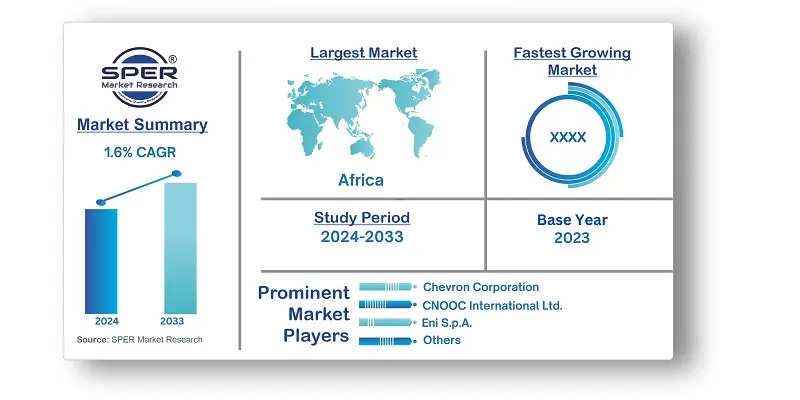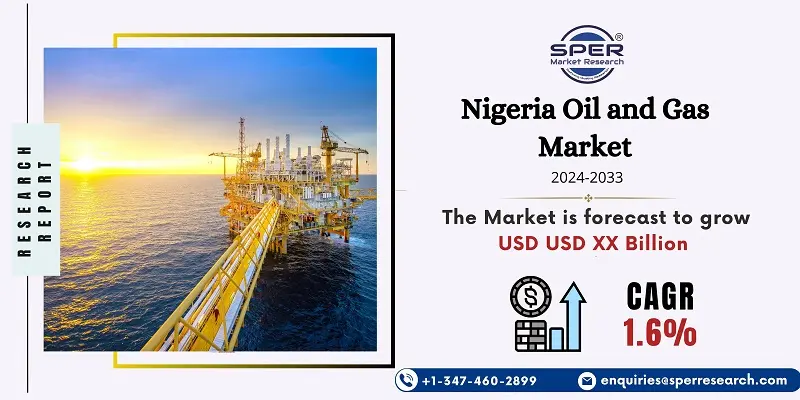
Nigeria Oil and Gas Market Growth, Size, Trends, Revenue, Scope, Demand and Future Outlook
Nigeria Oil and Gas Market Size- By Type, By Extraction, Regional outlook, Competitive Strategies and Segment Forecast to 2033
| Published: Aug-2024 | Report ID: POAE2469 | Pages: 1 - 107 | Formats*: |
| Category : Power & Energy | |||
- August 2022; NNPC, Nigeria's state-claimed oil firm, restored its oil creation imparting arrangements to global oil organizations Shell, Equinox, Chevron, ExxonMobil, China's Sinopec, and Nigerian firm South Atlantic Oil for five profound water blocks. The organization intends to create up to 10 billion barrels of oil over the course of the following 20 years. NNPC together and independently possesses the OML 128, 130, 132, 133, and 138 blocks.
- June 2022; The Nigerian government endorsed the execution of a gas pipeline project that will connect Nigeria and Morocco. This pipeline was an expansion of a current gas pipeline that has been moving gas from southern Nigeria to Benin, Ghana, and Togo beginning around 2010. The Nigeria-Morocco project traverses roughly 6,000 km and goes through 13 African nations along the Atlantic coast. The essential goal of this undertaking is to give petroleum gas to landlocked nations like Niger, Burkina Faso, and Mali. The assessed volume of flammable gas to be conveyed to Morocco through this pipeline surpasses 5,000 billion cubic meters.


| Report Metric | Details |
| Market size available for years | 2020-2033 |
| Base year considered | 2023 |
| Forecast period | 2024-2033 |
| Segments covered | By Type, By Extraction |
| Regions covered | North Central, North West, South West, Rest of Nigeria |
| Companies Covered | Chevron Corporation, CNOOC International Ltd., Eni S.p.A., Exxon Mobil Corporation, Lekoil Nigeria Limited, Nigerian National Petroleum Corporation, Pinnacle Oil and Gas Company Limited, Shell Plc, Sterling Oil Exploration & Energy Production Co. Ltd., and Total Energies SE. |
- International Oil Companies (IOCs) and National Oil Companies (NOCs)
- Oilfield Services Companies
- Government Agencies and Regulators
- Investors and Financial Institutions
- Energy Consultants and Analysts
- Local Communities and Stakeholders
| By Type: |
|
| By Extraction: |
|
- Nigeria Oil And Gas Market Size (FY’2024-FY’2033)
- Overview of Nigeria Oil And Gas Market
- Segmentation of Nigeria Oil And Gas Market by type (Downstream Oil, End Use, Downstream Gas)
- Segmentation of Nigeria Oil And Gas Market by Extraction (On-Shore, Off-Shore)
- Statistical Snap of Nigeria Oil And Gas Market
- Expansion Analysis of Nigeria Oil And Gas Market
- Problems and Obstacles in Nigeria Oil And Gas Market
- Competitive Landscape in the Nigeria Oil And Gas Market
- Impact of COVID-19 and Demonetization on Nigeria Oil And Gas Market
- Details on Current Investment in Nigeria Oil And Gas Market
- Competitive Analysis of Nigeria Oil And Gas Market
- Prominent Players in the Nigeria Oil And Gas Market
- SWOT Analysis of Nigeria Oil And Gas Market
- Nigeria Oil And Gas Market Future Outlook and Projections (FY’2024-FY’2033)
- Recommendations from Analyst
1.1. Scope of the report1.2. Market segment analysis
2.1. Research data source2.1.1. Secondary Data2.1.2. Primary Data2.1.3. SPER’s internal database2.1.4. Premium insight from KOL’s2.2. Market size estimation2.2.1. Top-down and Bottom-up approach2.3. Data triangulation
4.1. Driver, Restraint, Opportunity and Challenges analysis4.1.1. Drivers4.1.2. Restraints4.1.3. Opportunities4.1.4. Challenges4.2. COVID-19 Impacts of the Nigeria Oil And Gas Market
5.1. SWOT Analysis5.1.1. Strengths5.1.2. Weaknesses5.1.3. Opportunities5.1.4. Threats5.2. PESTEL Analysis5.2.1. Political Landscape5.2.2. Economic Landscape5.2.3. Social Landscape5.2.4. Technological Landscape5.2.5. Environmental Landscape5.2.6. Legal Landscape5.3. PORTER’s Five Forces5.3.1. Bargaining power of suppliers5.3.2. Bargaining power of buyers5.3.3. Threat of Substitute5.3.4. Threat of new entrant5.3.5. Competitive rivalry5.4. Heat Map Analysis
6.1. Nigeria Oil and Gas Market Manufacturing Base Distribution, Sales Area, Product Type6.2. Mergers & Acquisitions, Partnerships, Product Launch, and Collaboration in Nigeria Oil and Gas Market
7.1. Nigeria Oil and Gas Market Size, Share and Forecast, By Type, 2020-20267.2. Nigeria Oil and Gas Market Size, Share and Forecast, By Type, 2027-20337.3. Downstream Oil7.4. End Use7.5. Downstream Gas
8.1. Nigeria Oil and Gas Market Size, Share and Forecast, By Extraction, 2020-20268.2. Nigeria Oil and Gas Market Size, Share and Forecast, By Extraction, 2027-20338.3. On-Shore8.4. Off-Shore
9.1. Nigeria Oil and Gas Market Size and Market Share
10.1. Nigeria Oil And Gas Market Size and Market Share By Region (2020-2026)10.2. Nigeria Oil And Gas Market Size and Market Share By Region (2027-2033)10.3. North Central10.4. North West10.5. South West10.6. Rest of Nigeria
11.1. Chevron Corporation
11.1.1. Company details11.1.2. Financial outlook11.1.3. Product summary11.1.4. Recent developments
11.2. CNOOC International Ltd.11.2.1. Company details11.2.2. Financial outlook11.2.3. Product summary11.2.4. Recent developments11.3. Eni S.p.A.11.3.1. Company details11.3.2. Financial outlook11.3.3. Product summary11.3.4. Recent developments11.4. Exxon Mobil Corporation11.4.1. Company details11.4.2. Financial outlook11.4.3. Product summary11.4.4. Recent developments11.5. Lekoil Nigeria Limited11.5.1. Company details11.5.2. Financial outlook11.5.3. Product summary11.5.4. Recent developments11.6. Nigerian National Petroleum Corporation11.6.1. Company details11.6.2. Financial outlook11.6.3. Product summary11.6.4. Recent developments11.7. Pinnacle Oil and Gas Company Limited11.7.1. Company details11.7.2. Financial outlook11.7.3. Product summary11.7.4. Recent developments11.8. Shell Plc11.8.1. Company details11.8.2. Financial outlook11.8.3. Product summary11.8.4. Recent developments11.9. Sterling Oil Exploration & Energy Production Co. Ltd.11.9.1. Company details11.9.2. Financial outlook11.9.3. Product summary11.9.4. Recent developments11.10. Total Energies SE11.10.1. Company details11.10.2. Financial outlook11.10.3. Product summary11.10.4. Recent developments11.11. Others
SPER Market Research’s methodology uses great emphasis on primary research to ensure that the market intelligence insights are up to date, reliable and accurate. Primary interviews are done with players involved in each phase of a supply chain to analyze the market forecasting. The secondary research method is used to help you fully understand how the future markets and the spending patterns look likes.
The report is based on in-depth qualitative and quantitative analysis of the Product Market. The quantitative analysis involves the application of various projection and sampling techniques. The qualitative analysis involves primary interviews, surveys, and vendor briefings. The data gathered as a result of these processes are validated through experts opinion. Our research methodology entails an ideal mixture of primary and secondary initiatives.



Frequently Asked Questions About This Report
PLACE AN ORDER
Year End Discount
Sample Report
Pre-Purchase Inquiry
NEED CUSTOMIZATION?
Request CustomizationCALL OR EMAIL US
100% Secure Payment






Related Reports
Our Global Clients
Our data-driven insights have influenced the strategy of 200+ reputed companies across the globe.






















